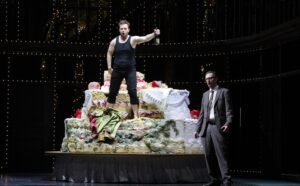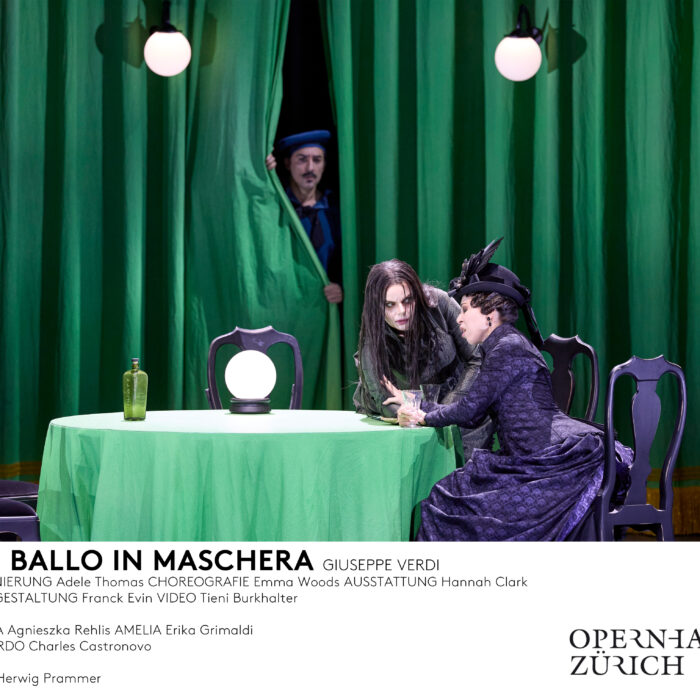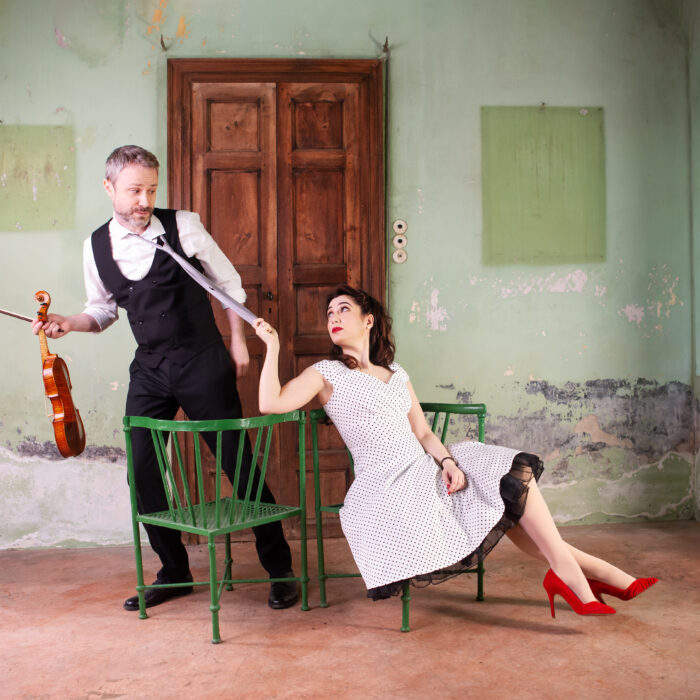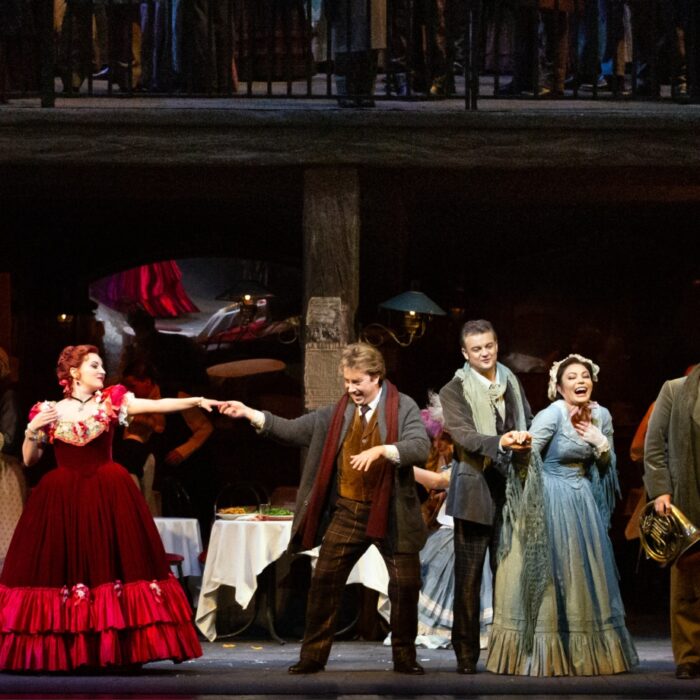
Glyndebourne Opera Festival 2023-24 Review: Don Giovanni
By Mike Hardy© Glyndebourne Productions Ltd. Photo: Richard Hubert Smith
Trigger warning: Mozart aficionados, look away now.
One might think Wolfgang Amadeus to be somewhat overrated, and the fact that he was hugely prolific, widely acknowledged to be a prodigy and is almost globally asserted to have been a genius, does little by way of endearing his music to my ear. I appreciate, it’s not HIM, it’s probably me.
But that mid to late 18th century classical era holds little for me in the way that the ardent passions of the romantic period does. It fails to move me in the way the beautifully emotive music and soaring high notes that went on to define that era and the post-romantic verismo era.
I just find Mozart to be twee. Not to mention, a bit “samey.” Like I said, it’s not him, it’s me.
The Problems With ‘Don Giovanni’
“Don Giovanni,” ostensibly, could have been written yesterday, such are its themes of promiscuity, seduction, and amorality. Certainly, Paul Higgins’s revival of French director Mariame Clément’s new staging attempts a very contemporary take on the tale, set as it is, in a sombre looking old-fashioned Hotel.
Mozart’s composition, based on a folktale, is a deeply contrasting mix of frivolity and dark seriousness and has always been provocative since its inception. If one is not conversant with the story, then one may well struggle to fully grasp it, especially based on this production; or, at least fail to make any sense of some of the more allegorical scenes.
In a nutshell, Don Giovanni is the unpalatable face of patriarchy personified; a rampant Lothario whose appetites seemingly know no bounds. Both a rapist and a killer, seemingly, he gets to meet an unsavory end when he is dragged to the pits of hell when failing to repent for his sins. All clear so far? Good.
In the first act, we are presented with a combined hen and stag party, courtesy of principal characters Zerlina and Masetto, although its depiction here, with the nubile female attendees in their garish pink tutus and externally mounted plastic breasts, accompanied by the males in their stag-horn head attire suggests a rather bizarre brothel. Indeed, a number of the guests are seen to enter and exit various chambers, intimating obvious, casual couplings.
Ideal backdrop, then, for our anti-hero who, suitably masked, exits the chambers of Donna Anna who is attempting to prevent his escape after him having assaulted her. Their commotion summons her father, the Commendatore, who dies in the subsequent struggle with the fleeing Don Giovanni. The overwrought Donna Anna, now having fainted, is then attended by Don Ottavio, her muse, who attempts to console her, making the first of his many righteous declarations of his intention to avenge her father’s death.
We are then presented with another of Giovanni’s conquests, Donna Elvira, heartbroken and lost, forlornly seeking the man who abandoned her. Giovanni again flees the scene, leaving his hapless and exploited servant Leporello to smooth things over. Not to be deterred, our relentless Casanova moves his attention to Zerlina, now celebrating her wedding to Masetto, whom he manages to isolate and almost ensnare with his charms before being interrupted. Yet, as the net closes in on him, he again manages to secure his escape by the skin of his teeth.
Act two sees Donna Elvira still searching for her lost lover, and Giovanni this time avoids her by disguising his faithful servant Leporello as himself, who not only somehow convinces her that he is, indeed, her repentant, absent lover, but also convinces Anna, Ottavio, Masetto and Zerlina that he is Giovanni. Leporello manages to avoid their wrath only when he reveals his true identity.
The story then races towards its conclusion when a supposed statue, possessed by the spirit of the murdered Commendatore, warns Giovanni of his impending doom. Unfazed, Giovanni invites the statue phantasm to dinner, upon which occasion the latter invites the former to repent for his sins and change his ways. Defiantly refusing to do so, Giovanni is dragged down to, literally, flaming hell.
Leporello, Elvira, Anna, Ottavio, Masetto and Zerlina contemplate the fate of the libertine, conferring he was justly punished for his crimes.
Quite. And if you struggled to sufficiently grasp the fundamentals of this tale here, then you will almost certainly fare no better if you get to see the performance in person.
I have already declared my lack of adulation for Mozart, but this opera could have been so much more impactive, had he written more convincing, wholesome characters as his leads. Further, Clément’s treatment of them removes any propensity for the audience to have empathy with pretty much any of them or to attach much credibility to their personas.
Of course, it is absolute de rigueur to strongly dislike “Don Giovanni” from the outset, not least given the rather inflammatory subject material in the current Me Too climate. But, despite his obvious amorality and debauchery, and the fact that the death of the Commendatore is portrayed here as, almost, an accident, I found it impossible to square his punishment with his crimes.
Additionally, the remaining characters possess little, here, in the way of anything to elevate them to any appreciable status. Don Ottavio assumes the principal role of hero, but is clearly incapable of fulfilling it, given that he comes across as a “simp” in its true, slang definition: overly submissive or even desperate for the attention or affection of someone without receiving anything in return. Certainly, the object of his desires, Donna Anna, seems very unlikely to satiate his appetite in the foreseeable future, given her seemingly interminable state of almost overbearing distress and grizzling.
Donna Elvira is, by necessity, exceedingly obtuse, given that she is required to believe that Leporello is actually her desperately sought and pined for lover, Giovanni, by virtue of the fact that he is wearing the latter’s garments. Further, and despite the attesting of all around her as to the obvious wickedness of Giovanni, she continues to yearn for him. Masetto comes across as overly laddish, if not buffoonish, and his new wife, Zerlina, is tangibly unchaste and unreliable, given that it was only the interruptions of Elvira that prevented her from acquiescing to Giovanni’s seductions. Even the wretched Leporello fails the litmus test, given that he not only enables but clearly aspires to enjoy the same life as his master, despite his frequent protestations at Giovanni’s behavior.
But whilst Mozart’s music never quite thrills, opera, for me at least, is predominantly about the voice and in that respect this production triumphs.
Cast Highlights
Baritone Andrei Bondarenko, 2011 BBC Cardiff Singer of the World, returns to Glyndebourne in the title role. His pleasing, trumpeting baritone presents an almost rogue mischievousness rather than malevolence. His “Finch’han dal vino,” Champagne song, was actually quite rousing, and his “Deh, vieni alla finestra” almost making him a tad endearing as well as affirming his credentials as a first rate seductor.
Equally, vocally resplendent, was Alexandra Lowe, Second Prize winner at the 2020 Glyndebourne Opera Cup, as Donna Elvira. Her “Mi tradi quell’alma ingrata” was truly evocative, sung with a richness and attesting beauty.
Award-winning soprano Kseniia Proshina makes her Glyndebourne debut in the role of Donna Anna and her sweet, emotive soprano succeeds well here, whilst displaying a fine gamut of emotions. Her “Or sai chi l’onore” was deeply impassioned whilst her “Ah! no mio bene” was utterly entrancing.
Whilst ostensibly weak in character as Don Ottavio, Maltese tenor Nico Darmanin is now well established in the Bel Canto repertoire, and he puts in a strong vocal performance here, albeit with a light lyric tenor which never seems to quite elevate to the “heroic tenor” status demanded by this role. His ‘‘Il mio tesoro” in the second act, however, prompted the warmest and most prolonged applause of the performance.
Soprano Charlotte Bowden as Zerlina, and baritone Michael Ronan as Masetto ham it up with cuteness and more than enough vocal competence. Bowden’s “Batti batti bel Masetto” was particularly enchanting, and Ronan has a very promising career with his sonorous, bass-baritone.
Sam Carl entertains and beguiles with, not only a wonderfully rich, full-voiced Bass-Baritone, but also conducts himself with the mannerisms of a silent movie actor, effortlessly providing much needed comedic interactions throughout the performance as well as injecting almost palpable emotions of horror, fear, and wretchedness at key moments. On this outing, he stole the show.
Bulgarian Bass Ivo Stanchev as The Commendatore produces a suitably, doom-laden voice for Giovanni’s spectral nemesis.
Production Highlights
An opera built around such delicate and contentious themes was always going to be tricky to present, right from its very first showing in the late 18th Century. But in modern society, beset by “cancel culture” at every turn, it poses a potential landmine. I am unsure as to the project that Mariame Clément and her designer, Julia Hansen originally envisaged; certainly, the employment of salacious, if not downright lewd enactments at certain points would probably not have escaped censure had they been contrived by a man. I have already alluded to the large, fake, plastic breasts worn by the female characters and ensemble in the first act, but this lascivious prop was surpassed when the paintings hanging on the walls of the hotel were flipped over to reveal actual photographs of real breasts, intended as a metaphor to represent Giovanni’s conquests.
More saliently, for me, the women were not, at any stage, portrayed as strong or as women of substance. Both Anna and Elvira are presented as rather frail and melodramatic, the latter obsessive and desperate, who gets to win the lewdness stakes outright when she falls to her knees at the feet of Leporello, whom she believes to be Giovanni, burying her head beneath his garments to simulate what the Sunday tabloid newspapers used to call “a sex act.” Zerlina comes across as being a bit of a minx, seemingly easily won over by Giovanni and resorting to sexual innuendos in her reconciliation with, and later comforting of, Masetto after his beating by Giovanni.
Morals and objectivity aside, this was a staging that at best, was frequently perplexing and at worst, defied any logic. The second act loses the three-tier hotel balcony interior yet retains the hotel key cabinet at the front of stage in order to employ falling key fobs to spell out the Commendatore’s spooky message, rather than a gravestone inscription as was originally, and is traditionally performed. Further, the Commendatore, rather than a statue coming to life, makes his final appearance for his reckoning with Giovanni as underwhelmingly and clearly human – a big anti-climax to the preceding tension.
The aspects which were comprehensible often lacked any conviction or impetus. The fight between Giovanni and the Commendatore lacked any credibility and at best, the latter’s death appeared to be an obvious accident rather than the deliberate act of evil it should have been portrayed as. Weird, bizarre lighting in arranged bulbs to portray key images and icons in the second act only conspired to augment the confusion. The chorus members, musically and wonderfully vocal, frequently entered and exited the stage at various points throughout the performance for no tangible reasons.
Overall, and despite its frequent confusing narrative, the whole conspired to produce a visually engaging, often entertaining, and provocative spectacle. Just don’t try and look too far beyond the metaphors. Instead, take pleasure in a fine young cast and the accomplished singing.
In the pit, Stephanie Childress conducted with consummate professionalism, seemingly as one with the Glyndebourne Sinfonia and her knowledge and passion for Mozart is clearly substantive, coaxing precision and meticulousness from her orchestra.



